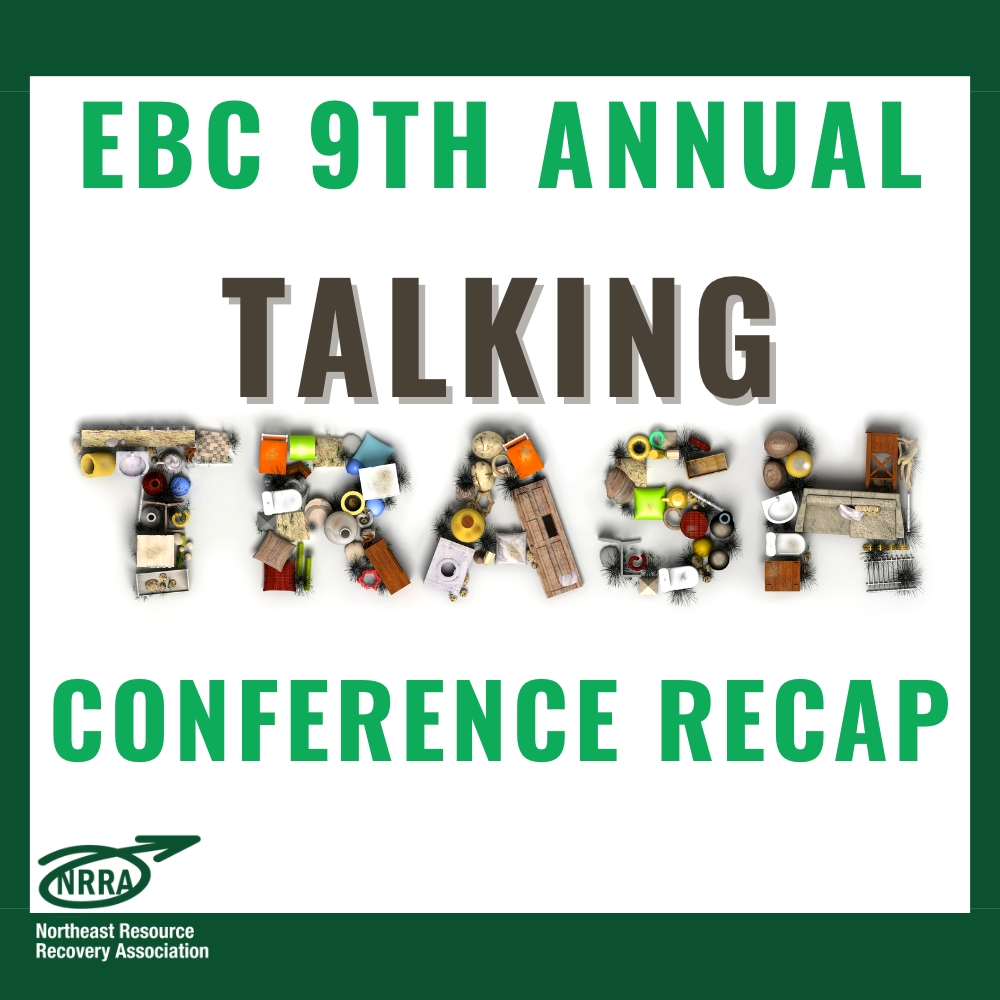EBC 9th Annual Talking Trash Conference Recap
April 20, 2023
On Tuesday April 11, NRRA Executive Director, Reagan Bissonnette, attended the Environmental Business Council of New England (EBC) 9th Annual Talking Trash Conference for Northern New England. NRRA was a conference partner along with the Solid Waste Association of North America for the event, and Reagan served on the conference planning team. This year, Reagan suggested that the conference highlight concrete solutions to solid waste problems, rather than focus mostly on the problems. The group agreed and identified three main topics to cover: municipal solid waste, organics, and soils and sludge. While introducing the conference, Reagan encouraged speakers to define any acronyms used, because while most of the audience was experienced solid waste professionals, there are always new people we want to welcome into the conversation.
Opening the first presentation, Redirecting Municipal Solid Waste, the moderator noted that if the proposed Dalton landfill is constructed, it would be the first new landfill built in New England in 30 years.
Sarah Nichols from the Natural Resources Council of Maine discussed the first-in-the-country Extended Producer Responsibility (EPR) for Packaging Law in Maine and how it operates. Many other countries have similar EPR laws, including most provinces in Canada. Producers of packaging pay into a stewardship fund by per ton estimates of what they generate, then municipalities get reimbursed for handling that packaging. She was followed by Cory Mansell from the Center for EcoTechnology, who explained how CET provides free waste audits for businesses and institutions to help them save money and reduce waste. Cory also emphasized the importance of creating case studies to motivate others and provide guidance for waste reduction.
 The next presentation, How to Unleash Organics, was moderated by Reagan.
The next presentation, How to Unleash Organics, was moderated by Reagan.She first asked for a show of hands: how many attendees divert food waste at home in any way, whether feeding backyard chickens, composting, etc. About 40% raised their hands. Then she asked how many diverted food waste at their place of employment. Perhaps 20% raised their hands.
Reagan went on to challenge everyone to consider how they can increase food waste diversion at home and at work so we in the solid waste industry can set an example for others.
She also spoke about how HB 300 and HB 462 are pending bills designed to increase food waste diversion in NH.
Holden Cookson, from Agri-Cycle, described how they have 65+ routes in New England and the mid-Atlantic daily hauling material to their anaerobic digester in Maine and other partner facilities. He pointed out that businesses and others can experience savings by diverting food waste, but only if they "right size" their trash and recycling costs, such as by reducing how often their MSW needs to be picked up after removing the food waste from it.
Chris Lucarelle, from Waste Management, shared how their CORe facility in Massachusetts receives organic material, and explained that when looking to build similar facilities elsewhere, they are looking for a place where there are social drivers (people are asking for this service), regulatory drivers (such as organics waste disposal bans), and the right economic conditions (high MSW tipping fees).
Maine Senator Stacy Brenner discussed how legislation and policy relates to solid waste. Among other things, she discussed the challenges with PFAS contaminating Maine farms from biosolids use, how they are looking to revamp their bottle bill, and how Maine can prohibit out of state waste because the state owns its own landfill.

The final presentation covered Soils, Sludges, and Bulky Waste (oh my!) Representatives from W.L. French Excavating Corporation discussed the contaminated soil disposal crisis in Massachusetts and beyond. Contaminated soils typically come from construction sites, with the top contaminants of SVOCs (semi-volatile organic compounds) and heavy metals. Capacity to landfill this material in Massachusetts has dropped dramatically in recent years, requiring excavators to export the material out of state for disposal at increasingly higher costs. This has resulted in delays and some cancellations of construction projects as costs increase significantly, plus the increased transportation results in more greenhouse gas emissions. The in-progress solution is that organizations have formed the Massachusetts Soil Beneficial Reuse Coalition and provided a 5-part proposal to MassDEP to work on solutions for in-state reuse of these soils.
Janine Burke-Wells, from the Northeast Biosolids & Residuals Association, talked about biosolids. Sludge is the solid material in sanitary wastewater, either from wastewater treatment plants or on-site septic tanks. Biosolids is sludge that has been treated to ensure that it can be safely applied to land as a fertilizer or soil amendment (these are called beneficial reuses).
In recent years nationally, 53% of biosolids were applied to land as fertilizer, 32% landfilled, and 15% incinerated. But then, Maine discovered that many of its farms have been contaminated by PFAS from spreading biosolids on them as fertilizer. This means the largest use of biosolids has come into question, and we will expect to see more biosolids being landfilled going forward.
 In the final Q&A with a panel of the speakers, someone asked why NH lags behind other states in its management of solid waste and encouraging waste reduction.
In the final Q&A with a panel of the speakers, someone asked why NH lags behind other states in its management of solid waste and encouraging waste reduction.
After a pause, one person explained that quite simply, residents are not pushing their elected officials for change and that legislation was necessary to move the needle meaningfully.
Though the conference was not filmed, you can view the presentations on the EBC website.
